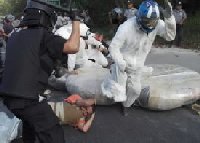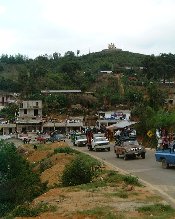 It was hot, but members of the world's business elite were looking relaxed yesterday at the start of a World Economic Forum meeting in the Caribbean resort of Cancun. Their trouble-making opponents were distracted.
It was hot, but members of the world's business elite were looking relaxed yesterday at the start of a World Economic Forum meeting in the Caribbean resort of Cancun. Their trouble-making opponents were distracted.Embattled
World Economic Forum has an easy life in Cancun,
says Henry Tricks
By HENRY TRICKS
 It was hot, but members of the world's business elite were looking relaxed yesterday at the start of a World Economic Forum meeting in the Caribbean resort of Cancun. Their trouble-making opponents were distracted.
It was hot, but members of the world's business elite were looking relaxed yesterday at the start of a World Economic Forum meeting in the Caribbean resort of Cancun. Their trouble-making opponents were distracted.
In a stroke of luck for the embattled organisation - more used to gathering in Davos, Switzerland - its meeting in Mexico coincided with the start of a two-week, 2,000-mile march by masked Indian rebels to Mexico City that has captivated the international anti-globalisation movement.
While fringe websites buzzed with chatter about blocking what they called the "World Economic Forum Beach Party", the hundreds of activists - some wearing masks and helmets - were easily outnumbered by riot police, and were also divided over how much force they were prepared to use.
zap's march passing san andres
 Most self-styled defenders of the oppressed were not in Cancun but in Chiapas, the southern state where the charismatic guerilla Subcommander Marcos was leading his Zapatista rebels on the start of an unarmed march to the capital to press for Indian rights.
Most self-styled defenders of the oppressed were not in Cancun but in Chiapas, the southern state where the charismatic guerilla Subcommander Marcos was leading his Zapatista rebels on the start of an unarmed march to the capital to press for Indian rights.
"We feel very relaxed," said Jose Maria Figueres, former president of Costa Rica and head of the Centre of the Global Agenda of the WEF.
He should not be too blase, however. Mexico may be one of the world's most open trading nations, with free trade agreements with over 30 nations, including the US, Canada and the European Union. But salaries have slumped, and Mr Marcos is a potential force for mobilising Mexicans against free trade.
His uprising, which brought with it a brief burst of fighting, was launched on January 1, 1994 in protest against the North American Free Trade Agreement which started the same day.
Since then, he has focused mainly on improving the rights of downtrodden Chiapas Indians.
But among anti-"neo-liberals" in the US and Europe, Mr Marcos has become a guru. His supporters hope that if he makes peace with Vicente Fox, Mexico's new president, he could become a powerful voice against globalisation.
"The Zapatistas were the forerunners of the anti-globalisation movement," says Cristophe Aguiton, a leader of the French group Attac, which has spearheaded international demonstrations.
"If they are able to come out of the jungle and lead a social movement it could be very significant."
So far, Mexicans have not been prominent in the anti-globalisation scuffles in Seattle, Davos and Prague. The country's main contribution to the cause has been the coining (by ex-president Ernesto Zedillo) of a Spanish word that aptly sums up the stance of those with a phobia for free trade - globalifobicos.
But since the success of the anti-Davos "World Social Forum" in Porto Alegre, Brazil last month, activists say there has been a revival of interest across Latin America.
Fanned by international support, the gaze of protesters is on a hemispheric free trade summit in Quebec City, Canada, in April.
In Mexico, there is still support for free trade, especially among the middle class. According to a telephone poll by Reforma newspaper last weekend, 68 per cent of Mexicans thought world trade was good because it brought "development, jobs and prosperity." Only 18 per cent saw the bad side - inequality, environmental damage and loss of sovereignty. In last year's elections, which put an end to seven decades of one party rule in Mexico, free trade was not a campaign issue, despite Mexico's commercial exposure.
Yesterday, Luis Ernesto Derbez, Mexico's economy minister, acknowledged that Nafta had spread its benefits unevenly. He said over the last decade, the export-oriented north of the country had grown an annual average 5.9 per cent, while the rural south had grown 0.4 per cent.
Mr Fox's response has been to promise a broader treaty, known as "Nafta- plus", that stretches down to Central America and involves cross-border integration among the plethora of small businesses in Mexico, the US and Canada.
"This free trade agreement has more future than ever," Mr Derbez said.
Despite his free trade zeal, Cancun is likely to mark a shift for both sides in the globalisation debate. For the first time, WEF officials are actively courting public debate with their detractors, provided they swear off violence first. One was expected in Cancun tomorrow, though anti-globalisation groups said it was at risk because of what they called police harassment.
Mr Figueres, the former Costa Rican president, told the Financial Times there were points of growing convergence between the forum and its opponents. "We may not see eye to eye but we have the same worries about making sure people are not excluded from development," he said. For regional reports, www.ft.com/americas